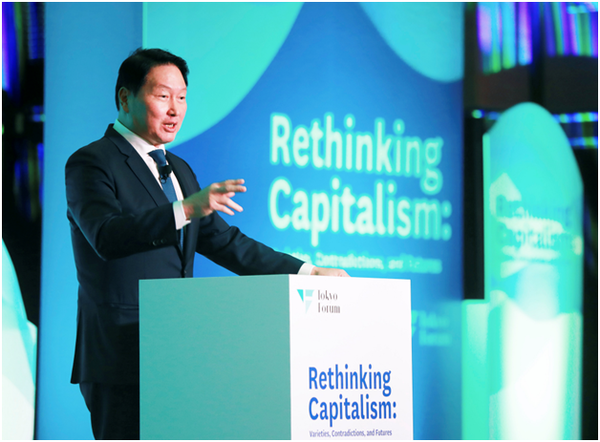Chey Tae-won Emphasizes Need for Capitalism Addressing Social Issues at Tokyo Forum 2025

Chey Tae-won, chairman of SK Group and chairman of the board of Chey Institute for Advanced Studies, said at the Tokyo Forum 2025 held in Tokyo, Japan on Nov. 21, “Under current capitalism, we are facing various social problems such as environmental issues and social polarization, and we need a new capitalist framework that measures and manages the social value obtained from solving these problems.”
Chey diagnosed the complex problems arising from the deepening of capitalism and emphasized the importance of measuring and managing social value to solve these issues at the Tokyo Forum 2025 held for two days starting from Nov. 21 at the Yasuda Auditorium of the University of Tokyo in Japan.
The Tokyo Forum is an international forum that has been jointly hosted annually since 2019 by the Chey Institute for Advanced Studies and the University of Tokyo in Japan to respond to global issues such as rapid technological development and geopolitical instability. This year, experts from various countries gathered to discuss under the theme “Rethinking Capitalism: Varieties, Contradictions, and Futures.”
Chey pointed out that “existing capitalism focused only on financial aspects and there were hardly any rewards or incentives for social value.” Social value means contributing to solving social problems beyond simply creating economic profits, thereby enhancing the happiness of various stakeholders.
Chey emphasized the importance of social value for sustainable growth and stressed the necessity of measuring and managing social value. He mentioned that technological changes such as artificial intelligence (AI) could be an important turning point, saying “Social value was difficult to measure easily, so optimal allocation of resources for creating social value was not achieved.” He said, “Measuring social value required significant transaction costs and there were many limitations such as data shortages,” and emphasized, “Now we have very good tools in terms of measurement such as digital technology and AI, so problem-solving is possible.”
Chey said, “When systematic measurement and evaluation of social value becomes possible, we can allocate resources differently and create incentives to change behavior.” He called this "new capitalism" and explained that if capitalism includes not only financial value but also social value, it could create a much better structure for a sustainable future.
Chey also introduced the case of social value measurement that SK Group is implementing at the subsidiary level as an example of quantifying social value. He said, “At SK, we evaluate various items such as job creation, tax payment, environmental impact, and community contribution by subsidiaries on a plus-minus basis,” and “When measurement begins like this, the decision-making method of companies changes.”
Finally, Chey said, “Now, the key performance indicators (KPI) of SK companies do not stop at financial value creation,” and “Beyond not undermining social value at minimum, the goal has become to continuously increase it every year.” He explained, “These changes also bring fundamental changes to the criteria for corporate resource allocation, moving from a focus on financial performance to a direction that considers social value together.”


